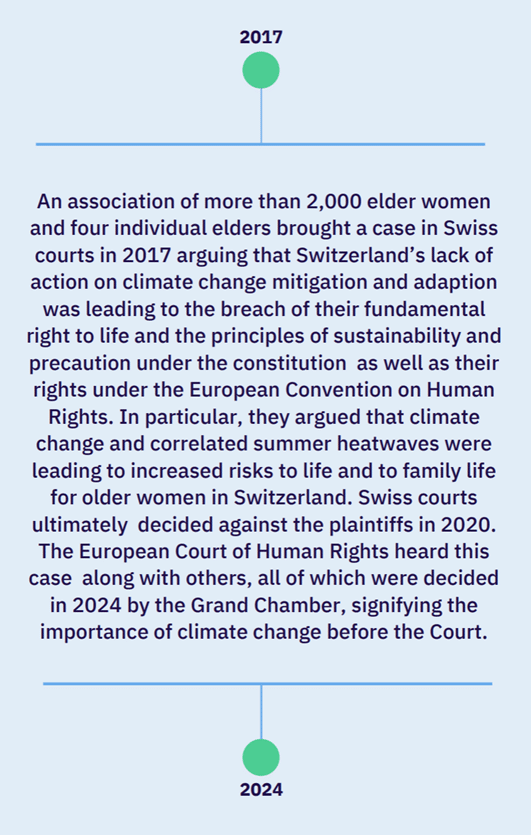
In this case, the Court:
- Clarifies that only elder people who can demonstrate they are particularly vulnerable (ill) can be considered as victims and hence bring a case before the Court. On the other hand, the Court clarifies that associations whose purpose is to represent people whose rights are being negatively impacted by climate change can have standing before the Court;
- Clarifies that minimal impact on climate change (the ‘drop in the ocean’ argument) does not excuse a country;
- Developed a new obligation / duty for States to protect their people from climate change under Article 8 of the Convention;
- Maintains that, in implementing this new obligation, States have less flexibility when it comes to developing an ambitious and comprehensive policy response to climate change mitigation and adaptation; and that, in developing their policy response, States must include a consideration of carbon budgets;
- Reasons that States have broader discretion when it comes to deciding how to implement their comprehensive climate policy response and, ultimately, fulfilling the new state obligation / duty to protect their people from climate change;
- Clarifies that the Court’s assessment of a country’s responsibility for the effects of its GHG emissions should also include the State’s GHG footprint from imported goods and their consumption (‘embedded emissions’);
- Clarifies that domestic courts need to guarantee practical and effective access to justice, including by meaningful examination of the scientific evidence concerning climate change; and
- In a dissenting opinion, criticises the “activist” approach of the Court in the fight against the climate emergency as overstepping

(1) Individuals, victims, associations and standing
Climate change litigation is an option only if plaintiffs have recourse to a court. In this case, the Court decided not to allow the four individual elder women to bring their case before the Court. The main reason was that, according to the Court, they had not sufficiently demonstrated that their “specific” situation led to a “real and imminent” danger (the legal test for “victim status”). In order for any specific individuals to have access to the Court in this case, she would have needed to demonstrate that, as an elder woman with serious illness, climate change induced heatwaves made her condition more dangerous.
The Court, instead, found that the association representing more than 2,000 Swiss elder women should be allowed to have standing before the Court. It reasoned that this was the case because of the “special” nature of climate change, and it devised specific climate focused tests to determine whether an association should be given access to the Court.
(2) Drop in the ocean argument
The Court made it very clear that a state cannot excuse itself from an obligation to take climate-related action based on its (limited) contribution to climate change. This was the ‘drop in the ocean’ argument that the Swiss Government presented, according to which the complex causal connection between climate change and the heatwaves (and other negative climate effects) would exonerate any single country from being held responsible for specific climate change damages. The Court in this respect clarified the difference between damage from traditional pollution (that comes from one specific source) and climate change, which has a multitude of sources.
(3-4) New state obligation / duty to protect people from climate change
The Court acknowledges that its role is not to interfere with a state’s democratic process of legislating and the subsequent implementation of new laws. However, the Court also recognises that these processes should not be immune from accountability in the context of the emerging relationship between climate change and human rights. In this case, the Court strengthens this relationship by making it abundantly clear that people cannot enjoy their right to a private and family life (Article 8 of the European Convention on Human Rights) without a safe and stable climate system. The Court then clarifies that for a state to meet its obligations under Article 8 it must protect the climate system. This has been interpreted by some as the Court developing a new state obligation / duty to protect its people from climate change.
In his dissenting opinion, Judge Eicke (UK) asserts that the Court has overstepped, and that this may end up being counterproductive because it ultimately distracts governments from developing comprehensive climate policies and instead puts them in a defensive / litigation mode, concerned that any action taken could be legally challenged.
(5) Margin of appreciation (discretion/flexibility)
The Court clarifies the content of this (potentially new) state obligation / duty to protect its people from climate change and frames it within its own environmental jurisprudence, according to which States should be afforded a wide margin of appreciation. However, the Court also deviates from its earlier work. In fact, States must do two things to comply with their “new” obligation.
First, States must develop a comprehensive policy, legislative and regulatory framework aimed at meeting ambitious 2050 carbon neutrality targets. Interim (shorter- and medium-term) targets need to be established to ensure proper inter-generational considerations. The state must ensure that the climate response is not a “paper tiger” but is linked to the necessary structures to enable it to be effective. In other words, States have a positive due diligence obligation in the context of human rights and climate change and they, in fact, have a limited margin of appreciation in setting their domestic climate targets and putting together an effective governance system to meet such target. This is where the Court deviates from previous environmental law jurisprudence. The Court clarified that, in assessing whether a national 2050 carbon neutrality target is ambitious enough and contributes to a state’s compliance with its human rights obligations, the concept of a carbon budget must be considered. Switzerland argued that there was not a universally agreed carbon budget methodology, but the Court was convinced that the model presented by the plaintiffs was solid enough to be considered.
Second, the Court clarifies that States continue to have a wider margin of appreciation as to how to implement its national carbon neutrality targets. Which sectors to focus on, through which measures, whether to rely on external measures (for example, carbon markets) are decisions reserved for the state.
(6) Embedded emissions
The Court also had to decide on extraterritorial emissions: whether Switzerland is also legally responsible under the Convention for the emissions generated abroad and attributed to Switzerland through the import of goods for household consumption. The Court reasoned that the relevant emitters (when products are used/consumed by the end consumer) are residents of Switzerland, and thus fall under Switzerland’s territorial jurisdiction, which means that the country must also answer for infringements due to such ‘embedded emissions’.
(7) Access to justice
The Court found that Switzerland violated Article 6(1) of the Convention (Access to a court), because Swiss courts had not sufficiently examined relevant aspects of the case (e.g. standing of the association). The European Court also rejected the Swiss courts’ justification for not examining the claims which was based on an allegation that there was still enough time to prevent global warming from reaching the critical limit, as this was not based on sufficient examination of the scientific evidence.
Climate change litigation implications
The Klimaseniorinnen case falls under C2LI scenario 1 (although ultimately decided by an international court): it is a case in which civil society challenged a governments’ climate response on human rights grounds. The ECtHR’s decision can have major implications for three reasons.
First, the nature of the Court itself is important. It is the first international court decision in a contentious case dealing with state obligations regarding climate change. Whilst immediate binding effects of the European Court’s decisions are limited to the country to which it refers, Switzerland in this instance, the reality is that every case creates a precedent that will be very persuasive in future cases. In many member countries, the European Convention on Human Rights (ECHR) can be invoked directly in domestic proceedings (e.g. Netherlands), and the Court’s interpretation of the new obligations under Article 8 can be relied on as the relevant standard for the state’s actions. Considering the number of countries that fall under the Court’s jurisdiction, including many countries for whom climate action may not be an urgent political priority, the legal points made by the Court will be relied on and referred to in new cases. At the same time, the ECHR has a globally recognised reputation, and it is likely that other courts – in- and outside the European context – may refer to its climate change jurisprudence.
Second, the Court has provided clarity on what countries must do to comply with their human rights obligation to protect the climate system. The practical steps that countries need to take are in step with the emerging trend of considering state obligations to protect the climate system as due diligence obligations.
Third, the Court’s approach to causation, the ‘drop in the ocean’ argument, carbon budgets and the responsibility for ‘embedded emissions’ in setting domestic climate targets can break new ground in future global and national climate policy-making.

